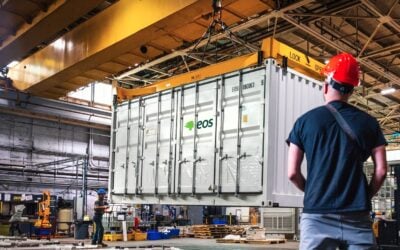
Some organisations consulted for a UK government study believe that the safety of second life EV batteries in residential energy storage “can never be guaranteed” while others believe an enabling framework is possible.
‘A Study on the Safety of Second-life Batteries in Battery Energy Storage Systems’ was prepared for the Office for Product Safety and Standards (OPSS) by academics at Newcastle University’s School of Engineering. OPSS is part of the Department for Business, Energy and Industrial Strategy (BEIS).
Enjoy 12 months of exclusive analysis
- Regular insight and analysis of the industry’s biggest developments
- In-depth interviews with the industry’s leading figures
- Annual digital subscription to the PV Tech Power journal
- Discounts on Solar Media’s portfolio of events, in-person and virtual
They consulted 39 organisations and companies about the use of second-life lithium-ion batteries for home energy storage systems (domestic lithium-ion battery energy storage systems or DLiBESS in the study’s nomenclature).
The diverse list included UK second life energy storage firm Connected Energy, global certifications body UL, battery insurance outfit Altelium, the London Fire Brigade, industrial manufacturing conglomerate Siemens, the German Energy Storage Association BVES and several vehicle OEMs (full list further down).
Extensive discussions with stakeholders have revealed two opposing views on the safety of second-life DLiBESS (SLDLiBESS), the study said.
The first view is that a safety framework can be put in place to allow the safe use of used EV batteries in home energy storage (or or DLiBESS), as long as the full history of the batteries is known and they can be tested effectively.
The second view shared by ‘some respondents’ is “…that the safety of such cells can never be guaranteed, and hence that second-life LiBs should not be employed under any circumstances in DLiBESS.” The report did not reveal which organisations gave which view.
The concluding remarks section added that consideration should also be given to whether stricter requirements are needed for home-build DliBESS which use second life batteries.
The fundamental challenge with the safety of used EV batteries in energy storage is that the batteries can age faster or at differing speeds in between the 75-80% state-of-health (SoH) when they become ‘second life’ and the 50-60% SoH which is considered the final end-of-life. This ‘knee’, as it is known, is where severe and potentially dangerous deterioration is expected to occur.
The point at which it can happen is difficult to predict and it can occur at higher SoH than expected. It can increase the risk of thermal runaway, internal short circuits and joule heating, the report said.
Early days for the second life energy storage market
Although the report focused on home energy storage, most publicised energy storage projects using second life EV batteries have been deployed in the commercial & industrial (C&I) and to a lesser extent utility-scale segment, as readers of Energy–Storage.news‘ coverage of the sector will know.
Ensuring the safe management of the battery systems has been a big topic of discussion in interviews conducted by this site. In an interview with Energy-Storage.news last year, Connected Energy CEO Matthew Lumsden highlighted the need for safety standards around second life batteries.
However, most of the modules in deployed projects to-date are from the EV factory floor rather than true ‘second life’ ones which have been in use for a sustained period. That means a higher average SoH and therefore a lower safety risk compared to a pure second life module-comprised energy storage system.
There is a substantial market of DIY-built off-grid and home energy storage systems using second life EV batteries procured through third party sellers. This is particularly the case in the US, according to Mike Ferry, president of California-based second life energy storage firm Smartville Inc. Part of that is down to the obligation to dispose of EV batteries falling on the consumer rather than on the OEM (as is the case in Europe).
Read the full 67-page study report from BEIS here. The full list of organisations consulted for the report is as follows:
- Altelium
- Aviva
- Birmingham University (ReLiB project)
- Bombus Energy Solutions (ESL/120)
- British Standards Institute
- BVES (German Energy Storage Association)
- Cawleys
- Cert-Fi
- Certsure
- Cleevely Electric Vehicles
- Connected Energy
- Department for Environment, Food & Rural Affairs
- Direct Line
- Electrical Safety First
- Environment Agency
- EV Recycling
- IFV (Netherlands)
- INERIS (TC/120)
- Jaguar Land Rover
- Johnson Controls Inc
- Levelise Ltd
- London Fire Brigade
- National Fire Chiefs Council
- Newcastle City Council
- Newcastle University (ReLiB project)
- Nissan Motor Manufacturing UK
- National Physical Laboratory
- Renewable Energy Association
- Regen
- Ricardo
- Siemens
- Silver Power Systems
- Solarwatt
- UL
- Varta
- Vehicle Certification Agency
- Warwick Manufacturing group
- XMS Capital
- Xtralis
Energy-Storage.news’ publisher Solar Media will host the eighth annual Energy Storage Summit EU in London, 22-23 February 2023. This year it is moving to a larger venue, bringing together Europe’s leading investors, policymakers, developers, utilities, energy buyers and service providers all in one place. Visit the official site for more info.






